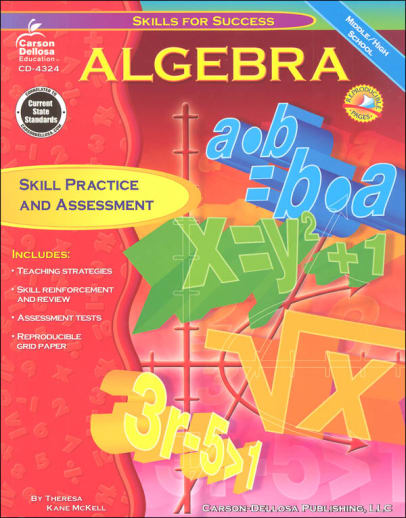Add some extra practice and review to your curriculum with the Skills for Success Algebra workbook. The book is divided into twelve sections connecting with algebra, using rules of algebra, writing linear equations, solving linear equations, graphing linear equations, applying linear equations, working with inequalities and absolute values, solving systems of linear equations, working with powers/exponents/polynomials, quadratic equations and factoring, calculating rational expressions, and applying rational equations and proportions. The topical organization make it easier to match the content with your curriculum. Each section includes practice pages, review, and a test; the number of pages varies by section. There are 128 pages and are reproducible for classroom and family use and answer keys are included. A little extra practice never hurts! ~ Donna
Algebra (Skills for Success)
SKU
034647
ISBN
9780887249358
Grade 6-12
These icons are designed to help you quickly understand and learn important information about our products.
Teaching Method
Traditional
Teacher-centered curriculum commonly used in classrooms that may include a text, teacher manual, tests, etc.
Charlotte Mason
A methodology based on the work of a 19th century educator who maintained that children learn best from literature (Living Books), not textbooks.
Classical
A methodology based on the Latin Trivium (three stages of learning), including the grammar stage (memorization and facts), logic stage (critical thinking), and rhetoric stage (developing/defending ideas).
Unit Study
A thematic or topical approach centered around one topic that integrates multiple subject areas.
Montessori (Discovery)
A methodology based on the work of a 20th century educator that emphasizes student and sensory-driven discovery learning and real-life applications.
Other
Other methodologies
Religious Content
Secular
Contains content contrary to common Christian beliefs (i.e. evolution).
Neutral
Avoids religious or theoretical topics or presents multiple viewpoints without preference.
Christian/Religious
Faith-based or including instructional religious content.
Learning Modality
Auditory
Learns through listening, talking out loud or reading out loud.
Visual
Learns through seeing, prefers written instructions and visual materials.
Kinesthetic/Tactile (Hands-On)
Learns through moving, doing and touching.
Multi-Sensory
Curriculum that employ a variety of activities/components.
Presentation
Sequential
Curriculum progresses through well-defined learning objectives. Emphasizes mastery before moving to the next topic.
Spiral
Topics and concepts are repeated from level to level, adding more depth at each pass and connecting with review.
Conceptual/Topical
Focus is on the “why,” often with a unifying concept as well as specific skills; coverage may be broader.
Teacher Involvement
Low Teacher Involvement
Student-led materials; parent acts as a facilitator.
Medium Teacher Involvement
A mix of teacher-led time and independent student work.
High Teacher Involvement
Teacher-led lessons; may utilize discussions, hands-on activities and working together.
Additional Materials Required
No other materials needed
Everything you need is included.
Other Materials Required
There are additional required resources that are a separate purchase.
Other Materials Optional
There are additional resources mentioned or recommended but are not absolutely necessary.
Consumable
Consumable
Designed to be written in; not reusable.
Non-Consumable
Not designed to be written in; reusable.
Our Price
$16.99 $16.99 $11.95
Rainbow Savings: $5.04
Description
Publisher's Description of Algebra (Skills for Success)
Perfect for students at different levels of understanding, Algebra for middle school and high school students provides teaching strategies as well as skill reinforcement and review.
Topics in this 128-page math resource book include these fundamental algebra skills:
- linear equations
- inequalities and absolute values
- systems of linear equations
- powers
- exponents
- quadratic equations and factoring
- rational expressions
This comprehensive algebra practice book supports NCTM standards and also includes practice pages, assessment tests, reproducible grid paper, and an answer key.
Features:- Answer Key
Details
| Product Format: | Paperback |
|---|---|
| Grades: | 6-12 |
| Brand: | Carson-Dellosa |
| ISBN: | 9780887249358 |
| Length in Inches: | 10.8125 |
| Width in Inches: | 8.5 |
| Height in Inches: | 0.25 |
| Weight in Pounds: | 0.8 |
Videos
Reviews

